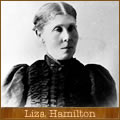The Women of East of Eden: Abra's Role

Are Steinbeck's women stereotypical? Criticism of Steinbeck's women often examines their social roles, concluding, rather dismissively, that he writes about mothers and whores. It may be more important to recognize that neither the mothers nor the prostitutes in his writings are one-dimensional. His fascination with the byways of human sexuality—from the whimsical Lopez sisters in The Pastures of Heaven who sell their bodies with their tortillas, to the lusty creatures in Tortilla Flat, to the motherly Faye, the sensual African-American madam whose funeral in East of Eden (Chapter 48) is as somber and mysterious as her life, and the depraved Kate—is a firm rejection of middle-class mores and values. The whorehouse is on the fringes of respectability, where much of Steinbeck's imaginative vision expands; and his prostitutes and madams, far from being stereotypical, run the full range of human experience.
Furthermore, his mothers are hardly tied to the stove. What they do have in common is an iron fiber and determination shared with the men. They dream, they pine, they are sexual creatures, they adapt. Motherly women create homes, and the values these women embrace—family, community bonds, communication, adaptation—are essential to the survival of the species. Those same values are essential to Steinbeck himself, who craved domestic tranquility. "I think my house is in order," he wrote in Journal of a Novel before he began writing in his new little workroom on 72nd Street in New York City. A day later, he wrote, "Everyone wants to have a family" (Journal of a Novel, page 8). In East of Eden, both Liza Hamilton and Abra Bacon the two most admirable women, create islands of domestic harmony; both are also resolute, independent, creative and adaptable.
Furthermore, his mothers are hardly tied to the stove. What they do have in common is an iron fiber and determination shared with the men. They dream, they pine, they are sexual creatures, they adapt. Motherly women create homes, and the values these women embrace—family, community bonds, communication, adaptation—are essential to the survival of the species. Those same values are essential to Steinbeck himself, who craved domestic tranquility. "I think my house is in order," he wrote in Journal of a Novel before he began writing in his new little workroom on 72nd Street in New York City. A day later, he wrote, "Everyone wants to have a family" (Journal of a Novel, page 8). In East of Eden, both Liza Hamilton and Abra Bacon the two most admirable women, create islands of domestic harmony; both are also resolute, independent, creative and adaptable.



